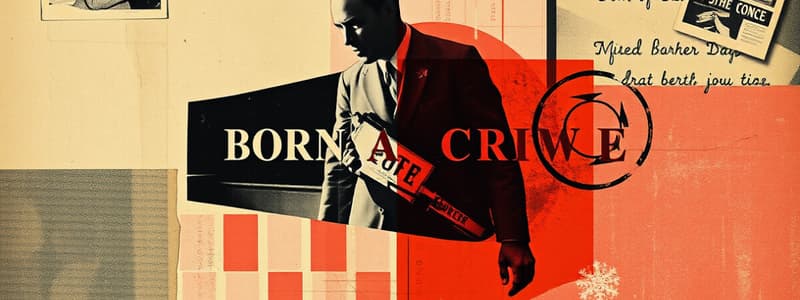Podcast
Questions and Answers
What is a metaphor?
What is a metaphor?
- Conversation between two or more characters
- A comparison using 'like' or 'as'
- A figure of speech where a word is applied to an object not literally applicable (correct)
- An exaggerated statement not meant to be taken literally
What do tone and mood represent in literature?
What do tone and mood represent in literature?
Feeling generated and writer's attitude
What defines a protagonist in a literary work?
What defines a protagonist in a literary work?
- The minor character in the story
- The character who presents challenges
- A narrative voice
- The good guy or main character (correct)
What are major conflicts in a story?
What are major conflicts in a story?
What does imagery appeal to?
What does imagery appeal to?
What is dialogue?
What is dialogue?
What does perspective refer to in literature?
What does perspective refer to in literature?
What is a description in literature?
What is a description in literature?
What is a simile?
What is a simile?
What is hyperbole?
What is hyperbole?
Flashcards
Metaphor
Metaphor
A figure of speech that suggests a symbolic meaning.
Tone and Mood
Tone and Mood
The writer’s attitude impacts the mood of the story.
Protagonist
Protagonist
Central character who faces the main challenges.
Antagonist
Antagonist
Signup and view all the flashcards
Imagery
Imagery
Signup and view all the flashcards
Dialogue
Dialogue
Signup and view all the flashcards
Perspective
Perspective
Signup and view all the flashcards
Description
Description
Signup and view all the flashcards
Simile
Simile
Signup and view all the flashcards
Hyperbole
Hyperbole
Signup and view all the flashcards
Study Notes
Literary Devices and Concepts
-
Metaphor: A figure of speech that suggests a symbolic meaning, exemplified by Trevor Noah’s feeling of being “thrown out of an airplane” reflecting his shock of learning about mixed-race children fleeing South Africa during apartheid.
-
Tone and Mood: The writer’s attitude impacts the mood; Noah views himself as evidence of his parents' criminality due to his mixed-race background, creating an ongoing sense of alienation.
-
Protagonist and Antagonist: The protagonist is the central character facing challenges. In this context, the racial divide in South Africa serves as an antagonistic force, illustrated through disparities in job opportunities and living conditions between blacks and whites.
-
Major Conflicts: Central issues in the narrative include systemic racism and inequalities; the chapter highlights the significant advantages held by whites over blacks, informing the reader of the broader social conflict.
Imagery and Techniques
-
Imagery: Vivid language appealing to the senses, such as descriptions of police brutality: “They wore riot gear... gunshots, screams, tear gas.” These descriptions immerse the reader in the chaotic environment.
-
Dialogue: Conversations between characters, like Trevor's mother discussing her right to have a child with Trevor's father, serve to portray familial dynamics and societal norms.
-
Perspective: The narrative is shaped by Noah’s personal viewpoint, detailing his experiences and observations of apartheid and its effects on mixed-race individuals.
-
Description: Detailed accounts provide insight into the harsh realities of racism, with examples ranging from employment discrimination to unequal treatment under the law.
Figurative Language
-
Simile: A direct comparison using "like" or "as," illustrated by the analogy of a black woman learning to type being comparable to a blind person learning to drive, emphasizing the improbability of the situation.
-
Hyperbole: Exaggerated statements highlight the severity and absurdity of circumstances, exemplified by the line about carefully sneaking Trevor in and out of the house, underscoring the extreme lengths taken to navigate societal challenges.
Studying That Suits You
Use AI to generate personalized quizzes and flashcards to suit your learning preferences.




